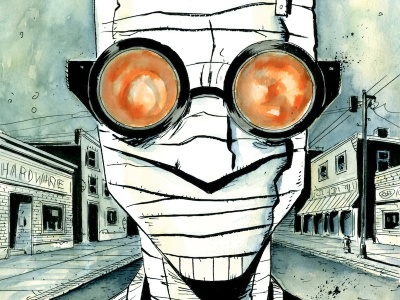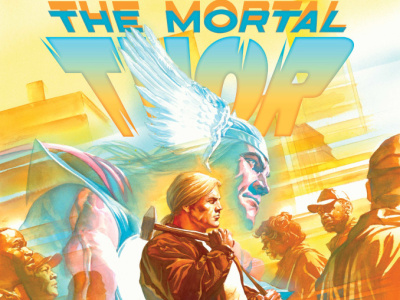Confessions of a Comic Book Guy is a weekly column by retailer Steve Bennett of Mary Alice Wilson's Dark Star Books in Yellow Springs, Ohio. This week, Bennett wraps up his discussion of comics content:
I've been gratified by some of your enthusiastic responses to my last couple of columns -- to be honest I'd rather been hoping it wasn't just me feeling this way about the state of modern super-hero comics. But while I certainly appreciate all of the support, I need to make a couple of points perfectly clear.
I'm Not Advocating A Return To 'The Good Old Days'
I've relished every Golden Age reprint I've gotten my hands on and cherish the comics I read growing up during the Silver, but we can't, won't and (just as importantly) shouldn't be moving backwards, because:
Comics Should Reflect Reality
Even the very embodiment of innocuousness, Archie Comics, where the plots haven't changed substantially since the late 1950s, meticulously tries to keep its comics at least contemporary looking so they don't lose their eternally preteen audience.
A medium of popular culture, by its very definition, has to reflect the concerns and attitudes of a mass audience if it wants onto it. We tend to think the so-called 'darkening' of super-heroes took place in a vacuum, ignoring what was going on in the larger world.
Starting in the late 60s TV dramas featuring doctors, lawyers and cops began to evolve past their pulp magazine/B-Movie roots. Their leads became more like real people, less like icons, who had to deal with the same social issues their viewers were struggling with (what we called 'relevance').
In the interceding years things have only gotten darker during Prime Time, we've gone from the super cool alpha private eye Joe Mannix and gentle, compassionate Marcus Welby, MD to the profoundly damaged Monk and brusque, drug addicted Dr. House.
Clearly, we as a people decided we wanted flawed, more human heroes, who battled their own fears and doubts as much as crime and disease were more believable.
Does any of this sound familiar?
Yes, as one respondent was good enough to point out to me, Art is supposed to challenge, show us the bleakness of existence and tragedy of the human heart in conflict with itself.
But entertainment is an altogether different animal, especially prime time network television which is supposed to reassure us and reaffirm our mostly deeply held beliefs.
So, no matter how grim things get on CSI or Law & Order, or what traumas the casts of The O.C. or Smallville have to endure, we know, even if the story is continued until the next episode (or have to wait until the end of the season - or even the beginning of the next), there's always something we can always count on. The Denouement.
Pronounced Dee-noo-ma, it's a French word meaning 'the unknotting' and in the context of prime-time television it's what Jerry Senfield called 'hugs and lessons.' It's that moment of catharsis in the final scene that finds our heroes safe at home, perhaps a little wiser for their adventures; justice triumphs over evil, with perhaps a hint of a moral. It's something most super-hero comic books have lacked for the longest time.
But, would you keep watching, say, Law & Order if, week after week, Detectives Fontana and Green and Assistant DA McCoy dropped case after case, allowing criminals to go free? That's pretty much the situation with the Batman titles today. Let's say Mr. Average Citizen, inspired by seeing Batman Begins, decides to buy a Batman comic book. He actually manages to find one, buys it, takes it home and discovers... Batman loses. Chances are he's not going to buy another one, but let's say he likes the story and art enough to give another issue a try. So he buys another...and Batman fails again. In a recent issue the supposedly most dangerous man alive couldn't beat a guy whose major strength is being crazy enough to affix a piece of his father's coffin to his face in a rooftop fist fight.
And the real problem is... as far as I, the veteran comic book reader, can tell this is the status quo for the title; it's not one of those long term 'branded' stunts/events like 'No Man's Land' or 'Knightfall' that will eventually end and we'll return to business as usual.
I read the trade magazines, go to all the industry web sites, and as far as I know the series has been reimagined as an ongoing urban crime drama where Blackmask is the lead and we're supposed to buy the next issue to see how Batman vaguely inconveniences him.
Can you imagine what Mr. Average Citizen must think?
In one of his last published stories, Will Eisner had his creation The Spirit meet Michael Chabon's The Escapist and the two characters chatted about the purpose of super-heroes. The best they could come up with 'easy answers and happy endings', and while I don't think Mr. Eisner saw those elements as being positives, that's exactly what super-heroes are for. And I'm afraid we've gotten to a point where most of us are too smart for our own good to realize that.
Although some retailers tell me otherwise, I'm really not coming at this from the angle that this approach to super-heroes is 'wrong' (but let's face it, I think it is), but that it limits sales to a much larger audience. Super-heroes can be as dark as they want to be... but nobody should be surprised if every year the readership gets a little bit smaller.
I don't know, it's entirely possible I'm wrong, but I find it more than a little interesting that Batman sells 66,000 copies and Disney Adventures Comic Zone sells well over 1.2 million.







